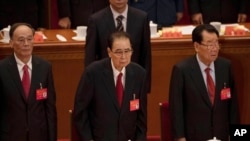Upon his death on Monday, Li Peng, China’s former premier, was officially extolled as a time-tested statesman in China.
But internationally, Li will undoubtedly be remembered as the "Butcher of Beijing” for his role in the bloody crackdown of the 1989 Tiananmen Square pro-democracy student movement, observers say.
“He fed erroneous and highly exaggerated reports to [then Chinese President] Deng Xiaoping about the extent, to which, the students were trying to overthrow the party and he exaggerated the dangers posed by the supporters of the pro-democracy movement,” said Willy Lam, a noted Chinese political analyst.
“So, he played a role in influencing Deng Xiaoping to make the fatal decision to use troops to crush the pro-democracy movement,” the Hong Kong-based analyst added.
The Butcher of Beijing
Lam said that Li well deserved the reputation as the "Butcher of Beijing," who, as the right-hand man of the then-paramount leader Deng, declared martial law and pressed ahead with a bloody suppression of the student protests in the early hours of June 4th, 1989.
China has never provided a full accounting of the violence, but rights groups estimate the figure could run into the thousands. The protests have remained a taboo subject in China.
A former movement student leader also agrees with the moniker given to Li.
“He is [was] the butcher of the June 4 Massacre. That’s how he should be remembered by the world, by the history, and hopefully, one day, in the textbooks in China,” said Wu’er Kaixi, who played a leading role in the 1989 protests.
While justice is yet to prevail, Wu’er said that he remains confident that, some day, Li’s and Deng’s corpses will be “whipped” for they will eventually be held accountable for the casualties caused after the crackdown.
Li’s Own Defense
In his diary published later in 2010, Li tried to defend himself by saying that he did what he had to do because “at any cost, I couldn’t allow a tragedy similar to the [decade-long] Chinese Cultural Revolution to repeat again in China.”
On Tuesday, the official obituary praised Li to have had taken “decisive measures to stop the unrest and pacify the counter-revolutionary riots.”
He “stabilized the domestic situation, and played an important role in this major struggle concerning the future of the party and the country”, Xinhua added.
An unapologetic Stance
Observers say, through Li’s death, the unapologetic stance taken by the hardliners within President Xi Jinping’s administration on the 1989 student-led protests is reconfirmed.
“His death confirms the thinking that it’s extremely unlikely that the current administration will overturn the verdict on the June 4th crisis on the Tiananmen [Square] crisis, which officially was defined as a counter-revolutionary turmoil,”
Lam said that, over the past 30 years, there have been calls and campaigns in China to redress the 1989 peaceful protests and make appropriate compensations to the movement’s victims.
But the chance of having a re-evaluation of the incident is getting slimmer, he added.
Li died of an illness in Beijing at the age of 91 on late Monday night, Xinhua reported.
He left behind his wife and three children.
Born in 1928 in China’s southwestern Sichuan province, Li was son to a former revolutionary communist leader.
Upon his graduation from Moscow Power Engineering Institute in 1954, Li started his career at the national power plant in China’s northwestern Jilin province.
He was first promoted to the premier’s position in 1987.
During his term in office, his family managed a large Chinese power monopoly, which the Chinese government broke up after Li’s second term as premier expired in 1998.
Li retired from all political ranks in 2003.
Another Bad Example
Critics say that Li set another bad example of cronyism in Chinese politics after his wife and children had been awarded with senior roles in the state-run energy sector, which Li used to specialize in.
During his time in office, the Three Gorges Dam project was another controversial project he had led, which is said to have now put hundreds of millions of people’s lives at risk.
“Without the support of Li Peng, who once headed the government’s hydro-electric power department, the Three Gorges Dam project wouldn’t have had been launched so quickly. So, in this regard, Li should be held responsible [for the problematic project],” said Zhang Lifan, a Chinese historian and commentator in Beijing.
China, early this month, downplayed the risk to the gorges, which appear to be warping badly, saying that the facility is in an acceptable “elastic state.”




